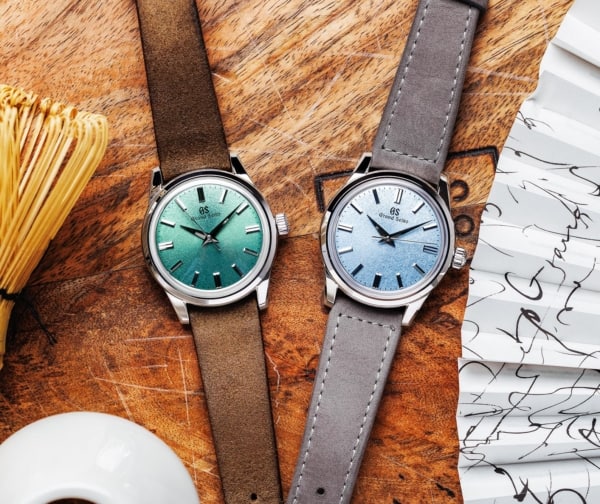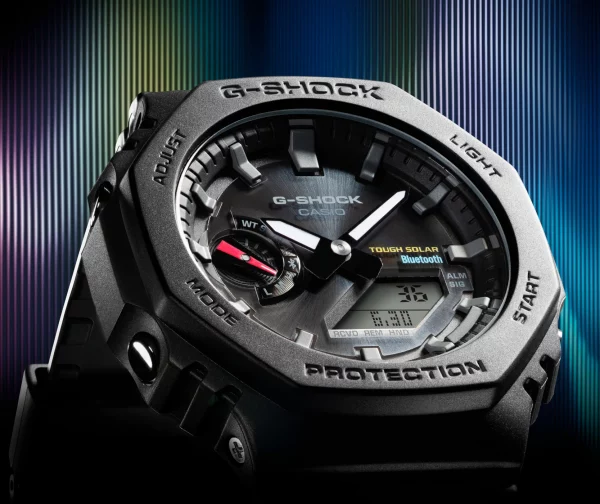This week’s Round-Table question is: What’s your number one rule when buying a used watch?
Let us know your answer in the comments, and if you have an idea for a Round-Table question, please email it to us for consideration!
James Enloe
The number one rule when buying a used watch is simple: buy the seller. There are other things to consider, obviously, but the seller is at the core of the transaction. They can either make things go smoothly or make the purchase be a miserable, rotten mess. If buying from a watch forum do your research: look for previous transaction history, check the feedback forums, ask about the seller from others that have bought from them.
For on-line retailers ask around, the various watch forums are a vault of information and someone will have the information you need to make an informed purchase. You can really save yourself some heartache and trouble by doing some quick checks before hand.
Mark McArthur Christie
Mr Ilya Ryvin has set the w&w scribbling collective a fine question here. It’s a properly taxing one. So far, it’s taken five espressos, a walk to the village butcher for a couple of pounds of sausages, a walk back and a sausage sandwich to think about. This is tough to pin down.
 The problem is, the No 1 rule keeps changing. Sometimes it’s all about buying a watch with your head. You look for something you think might be an investment on the way up, like a 1960s Rolex Exp 1. You spend hours researching resale values, checking dealer websites and, if you’ve really got it bad, old auction catalogues. You end up with a list of new bookmarks on your browser and a faintly embarrassingly detailed knowledge of the finer technical points of your new ticker. Here, the No 1 rule is potential investment value.
The problem is, the No 1 rule keeps changing. Sometimes it’s all about buying a watch with your head. You look for something you think might be an investment on the way up, like a 1960s Rolex Exp 1. You spend hours researching resale values, checking dealer websites and, if you’ve really got it bad, old auction catalogues. You end up with a list of new bookmarks on your browser and a faintly embarrassingly detailed knowledge of the finer technical points of your new ticker. Here, the No 1 rule is potential investment value.
Sometimes you need a watch for a specific task, maybe a world timer for a trip. So the research starts again with a different No 1 rule – functionality. How many timezones do you need? How easy do they have to be to change? Do you want the class and elegance of a Nomos Weltzeit or the unbustability and ping-on accuracy of an atomic G-Shock? It’s all about the functions. It’s probably worth caveating this…In the real, non-watchie, world, one very rarely ‘needs’ a watch at all. But that doesn’t stop any of us persuading ourselves.
Then there are the watches you buy with your heart and in a heartbeat. You’re out in town and suddenly your nose is pressed against the window of your favourite dealer. The curve of a case or the shape of a hand just catches your eye. Something about a watch appeals and that’s it, you’re through the door, your wallet is out and there’s a new face looking up at you from your wrist. The No1 rule? You wanted it.
Most of us kid ourselves about the investment thing or the need for a watch with a particular feature. But, in reality, the only rule that really matters is the heart’s rule over the head. It’s the only rule that connects the three most recent (and disparate) arrivals in the watchbox – a Zenith El Primero Rainbow flyback, a Bremont MBII and, er, a near-as-dammit new old stock Citizen Wingman/Raceman.
It’s not a rule, but there does seem to be a definite correlation between watch purchase and couple of glasses of decent Speyside malt.
Ilya Ryvin
All of my second-hand acquisitions have been online through forums like watchuseek and timezone, but after a number of not-so-smooth transactions I’ve become incredibly cautious when buying used watches. While I don’t have any hard rules, I do follow a simple philosophy: when you’re buying a watch, you’re also buying the seller. I will not deal with anyone who gives me a hard time for asking too many questions, or anyone who tries to pressure me into buying by telling me about all the other interested buyers lined up for the watch. While I appreciate the “warning,” it’s important I do my homework before dropping down some cash on a deal that generally offers very little security. I’m especially fond of sellers who offer a return policy (rare, I know), not because I’m likely to take them up on their offer, but because it shows me they’re confident with what they’re selling.
Brandon Cripps
My number one rule for buying a used watch is this: Decide for yourself the watch’s value, and be willing to pay it. The vast majority of used watches I buy are at auction, though the same philosophy works when buying directly from a seller. As many variables as you can imagine can go into what makes a watch’s value, but my top three are: (1) how much I like and want the watch, (2) the condition and originality of the watch, and (3) the watch’s value in the market. The second and third variables require a little research and set the baseline for what I will pay, which then gets pushed up or down based on the first variable. Once I decide what I’m willing to pay for a watch, I’ll go for it. If I get it, great; if I don’t, someone else valued the watch more than I did, and that’s ok. This method has always left me satisfied with the result of a sale, regardless of whether the watch came home with me or someone else.
Christoph McNeill
Good question, and a very important one too. I’m sure I won’t be the only one to give this answer either. The number one rule when buying a used watch is, “buy the seller”. What does this mean? I’ll tell ya. Sure you want to make sure you get the make and model you want, and you need to see good pictures that show any nicks or scratches, and you definitely want to make sure it’s mechanically sound.
But if you’re unsure of the character of the person selling to you, how do you know if they’re telling the truth? The single golden rule of watch (or anything for that matter), is to make sure you know who you’re dealing with. If you’re buying on eBay, it can be fairly easy to tell from the sellers feedback. If they have excessive negative or neutral feedback, avoid them; plain and simple. If you’re buying off the sales corner of your favorite watch forum, a little more due diligence is warranted. Check to see if they are a regular on the forum with discussion posts, or are they new? Ask them for references if you’re not familiar with them. If they’re legit, they’ll gladly provide them. If you get the runaround, them walk away. Bottom line is you need to feel comfortable with your seller, that’s the best way to have a good outcome buying a used watch.
Ed Estlow
The real first rule is that a used watch needs to be as advertised. Genuine. And more, verifiably genuine. Need more? Verifiable by ME. (that last one is tough…)
Two winters ago at the Tucson jewelry trade shows, I found a nice Universal Geneve Tri-Compax. For kicks, I texted a photo to a fellow watch nerd and asked his opinion. He posted it on Instagram and none other than Ben Clymer commented on the photo with something like, “Nice piece. Hands are wrong.”
“Hmmm…” says I. I trust Mr. Clymer. So now I’m thinking, “What else might be wrong, once I open the hood?”
That little interlude saved me $2500 (which was too much to pay for that particular watch, even if it was all original, but that’s another story).
So… Rule #1 is I, myself, need to be able to verify the watch in question. Which means due diligence – extensive research on the piece in question, so I can tell what’s right and what’s wrong (always assume something’s wrong when dealing in vintage).
Inspection and verification of the provenance is also key.
Oh, and so is one other thing. Know and trust the seller.
You’ve heard the old saw, “Buy the seller before buying the item.” Or something like that. What it means is, trust the seller enough to know they’ve also done their due diligence.
Hmmm… I guess that’s three or four rules. Hard to stop at one.
Sean Lorentzen
The first rule of used watch buying in our global watch market is simple. Location, location, location. On a platform like eBay with sellers all over the world, certain regions have gained a reputation of shoddy restorations and frankenwatches, and for the most part they’re reputations worth believing in. Watch lots from India, the Philippines, and Indonesia require extreme caution and should generally just be avoided. On the other hand, look for watches not coming from traditional seller locations, for example estate sales. Watches from estates are usually one-owner, and while they’re not always cosmetically the best, they’re more likely to be mechanically sound than a purchase from the big eBay houses in the Philippines.
Zach Weiss
My number one rule is one I actually rarely follow, but really should, though it did deter me from a recent almost-purchase: never buy a watch you can’t afford to fix. There are plenty of sexy vintage pieces out there, ones with very cool movements in them… column wheel chronos, alarms, hi-beats, triple calendar chronos and more… many of which you’d be amazed by the relatively low prices of… The thing is, if something in one of those movements breaks, it can cost you as much as buying the watch in the first place to fix. Considering their age (I regularly wear watches many years older than myself), and likely unknown service history, there is a fair chance something will go wrong at some point.
Of course, for the right watch it’s always going to be worth it, even if on the off chance it breaks you have to have it sit around for a few months while you put money aside to fix it. For me, that would be my Hamilton Chrono-Matic. Though it’s working well (knock on wood) that caliber 11 movement inside is notoriously expensive and difficult to service. The other issue is with watches that you might want to sell off again in the future…. Putting $500 into a $1000 watch doesn’t mean you can sell it for $1500… so, you end up losing a bit of your investment.
Watch Curmudgeon
I have never purchased a used watch, nor willI I ever purchase a used watch. That’s my number one rule. Period! But this only applies to me. I’d love to be able to do this, but I’m too damn paranoid. I treat all my watches, and I have quite a few, with fanatical care to the point of insanity. For example, I never even clap my hands after a performance because I’m worried about compromising my watch’s balance. My chronographs are rarely engaged due to the stress put on the mechanism. My Submariner never gets damp. And I’m always worried about magnetic fields.
So, if I were to buy a used watch, I’d be perpetually worried about how the previous owner treated it. Did he fall out of a canoe with it? Did he cut logs with a chain saw? Was he a sky diver? Did he applaud at concerts? See what I mean? A used watch would slowly drive me nuts.
HOWEVER…….there is an exception to my rule. If I were at a flea market or a garage sale and found a shoe box with some 1950’s Rolexes priced at $100, I’d take the plunge. I might even go as high as $150 for an ancient Breguet minute repeater. Yeah, “used” could be good!









 Featured Videos
Featured Videos







